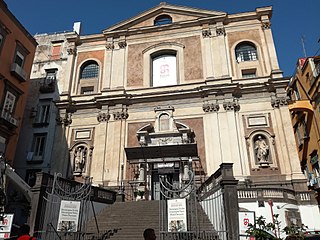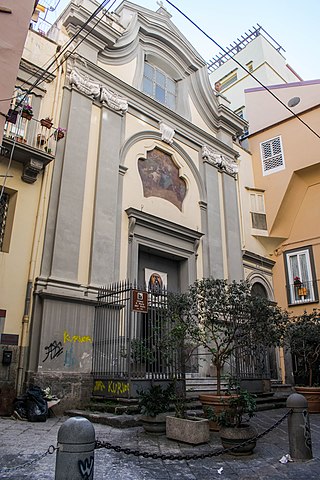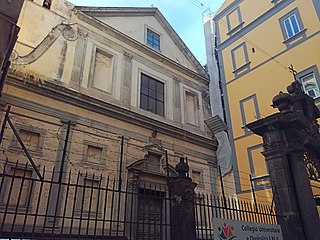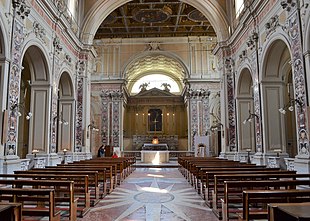
Cosimo Fanzago was an Italian architect and sculptor, generally considered the greatest such artist of the Baroque period in Naples, Italy.

Francesco Solimena was a prolific Italian painter of the Baroque era, one of an established family of painters and draughtsmen.

Santa Maria Donnregina Nuova is a church in central Naples, Italy. It is called Nuova ("new") to distinguish it from the older Angevin church of Santa Maria Donna Regina Vecchia.

Gesù Nuovo is the name of a church and a square in Naples, Italy. It is located just outside the western boundary of the historic center of the city. To the southeast of the spire, one can see a block away the Fountain of Monteoliveto and the piazza of the church of Sant'Anna dei Lombardi. The square is a result of the expansion of the city to the west beginning in the early 16th century under the rule of Spanish viceroy Pedro Alvarez de Toledo. The square of Gesù Nuovo contains three prominent landmarks:

The Church and Convent of the Girolamini or Gerolamini is a church and ecclesiastical complex in Naples, Italy. It is located directly across from the Cathedral of Naples on via Duomo. The facade is across the homonymous piazza and street from Santa Maria della Colonna. It is one block west of Via Duomo.

Santa Maria la Nova is a Renaissance style, now-deconsecrated, Roman Catholic church and monastery in central Naples. The church is located at the beginning of a side street directly across from the east side of the main post office, a few blocks south of the Church and Monastery of Santa Chiara. Today the adjacent monastery is a meeting site and hosts the Museo ARCA of modern religious art.

Sant'Anna dei Lombardi,, and also known as Santa Maria di Monte Oliveto, is an ancient church and convent located in piazza Monteoliveto in central Naples, Italy. Across Monteoliveto street from the Fountain in the square is the Renaissance palace of Orsini di Gravina.

Francesco de Mura was an Italian painter of the late-Baroque period, active mainly in Naples and Turin. His late work reflects the style of neoclassicism.
Annibale Caccavello (1515–1595) was an Italian sculptor of the Renaissance, active in his native city of Naples.

San Paolo Maggiore is a basilica church in Naples, southern Italy, and the burial place of Saint Cajetan, founder of the Theatines. It is located on Piazza Gaetano, about 1-2 blocks north of Via dei Tribunali.

Giovanni Battista Cavagna, also known as Cavagni or Gavagni was an Italian architect, engineer, and painter mainly in Naples, but also in Rome and Ascoli Piceno, Italy.

The Ospedale degli Incurabili or Complesso degli Incurabili is an ancient and prominent hospital complex located on Via Maria Longo in central Naples, Italy. Part of the complex, including the remarkable pharmacy, are now the Museo delle arti sanitarie of Naples.

Santa Maria dell'Aiuto or Holy Mary of Succour is a Baroque-style church, located at Vico S Maria dell'Aiuto number 10, near the church of Santa Maria la Nova in Naples, Italy

Santa Maria la Scala is a Baroque style church in a Piazzetta of the same name in Naples, Italy.

Santa Maria della Mercede e Sant'Alfonso Maria de' Liguori is a Roman Catholic church located in via San Sebastiano #1 in the historic center of Naples, Italy. It rises on the South-Eastern corner of the intersection of Via San Sebastiano - Via Santa Maria di Constantinopoli, and the Vico San Pietro da Maiella and the outlet of the Via Port'Alba, a narrow alley starting at the medieval gate of Port'Alba. The Vico San Pietro da Maiella feeds into the southernmost end of Via dei Tribunali, corner with via San Sebastiano, and on the Vico, neighboring to the east and behind the church, stands the Conservatory of San Pietro a Majella.

Santa Maria di Monteverginella is a Roman Catholic church in Naples, Italy. To the right of the facade, is the separate Chapel of Santa Maria della Concezione.

Santa Maria Regina Coeli is a Roman Catholic church in central Naples, Italy.

Santa Maria Egiziaca a Forcella, also known as the Church of Santa Maria Egiziaca all'Olmo, is a Baroque-style, Roman Catholic church located in the quartiere di Forcella, in the city of Naples, Italy.

The church of the Croce di Lucca is a religious edifice in central Naples, Italy, on the Via dei Tribunali.

Gesù delle Monache is a Roman Catholic church located near the Porta San Gennaro in central Naples, Italy. Over the years, the church was also a parish church known as San Giovanni Evangelista in Porta San Gennaro or San Giovanni in Porta.






















